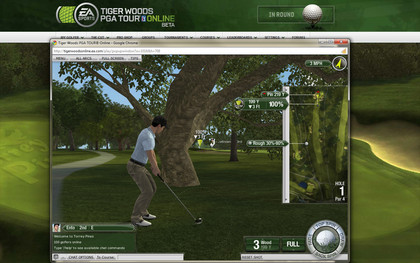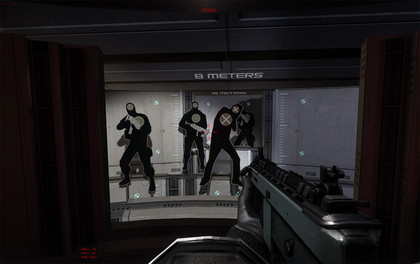Sign up for breaking news, reviews, opinion, top tech deals, and more.
You are now subscribed
Your newsletter sign-up was successful
Unity3D has been around since 2005, but only really hit its stride in the last couple of years. It's a project that's half engine and half game editor, the latter being achieved in a predominantly visual environment rather than requiring any coding knowledge. Which we'll come back to in a second.
First, let's talk about the games. You may have caught comedy dino hunting/driving game Offroad Velociraptor Safari when it carved its way through Digg et al a couple of years back - that's a Unity game. As are the other sublimely silly titles from its creator, Flashbang Studios - Minotaur China Show, Time Donkey, Jetpack Brontosaurus Dreams...
They may not look like Gears of War, but they're exceptionally visually charming, they offer full keyboard/mouse controls and, so long as you've got the Unity plug-in installed, they work in any browser, right off the bat.
Unity isn't limited to bizarro indie projects, however. Just this month, EA launched Tiger Woods (oops) PGA Tour Online, a full-on, console-like golf game which runs inside a browser.
All content is streamed incredibly quickly, and it's probably the best-looking 3D browser game you've ever seen. It may not be visually comparable to the latest Tiger Woods PGA Tour on 360, but it will probably blow your expectations of browser games out of the water.
It's powered by Unity, and it's a dry-run for EA's current rethink of how to tackle the increasingly hot potato of PC games. EA's solution: browser games for a semi-casual audience, tied to a login, social networking and micropayments and thus completely free from piracy concerns.
Let's just reiterate that: one of the biggest games publishers in the world is making browser games.
Sign up for breaking news, reviews, opinion, top tech deals, and more.

STEP FORWARD: EA's Unity-based Tiger Woods PGA Tour Online. It's a major step for the games publisher to take - and a major step forward for browser games, too
A browser-based FIFA is due later this year, and that'll really set things on fire. "Unity's initial market was comprised of smaller and independent developers", says its product evangelist Tom Higgins.
"Today, we're stronger than ever in the small scale indie developer market as evidenced by the rapid growth of our registered user base the last several months. As the technology has matured, though, its proven its performance and scalability, which has increased demand from major publishers and development houses."
In other words, we're going to see a lot more of this kind of thing. But at what point does Unity games start stepping on the toes of AAA PC and console games?
"When you look at a game like Bioshock 2 you're looking at the very front edge of 3D gaming, and that involves highly tuned engines specific to the purpose of those individual games," says Higgins.
"So while our engine might not reach the same dizzying heights, it can reach close, and do so in way that lets your content run on a much wider range of machines, platforms and configurations. With all that in mind I do think that the current generation ofUnitygames could be better, they could push the envelope further if desired as our engine still has more power yet to be tapped...
"As the developers continue to mature and we continue to drive our engine forward, I think that in-browser content made withUnitywill continue to close the gap against the consoles."
Unity really is becoming more impressive at a rate of knots, and the indie implementations are as interesting as the big-budget ones.
Take a look, for example, at Bullseye, a shooting gallery game recently released to drum up interest in the upcoming shooter Interstellar Marines, but which has become runaway enough a success that it's threatening to overshadow that which it's promoting.
Sure, the textures might not bear close investigation, but the curved geometry and the light and shadowing effects would sit just fine in a new console game. It's the kind of thing that has one suspecting that the first Warcraft-like MMO to use Unity will be huge.

IN SITE: Zero Point Software's Bullseye, a splendid-looking Unity-powered web game designed to promote its upcoming Interstellar Marines
On top of that, the Unity editor and engine is now free to anyone. Splash out for the Pro version and you get advanced features such as render-to-texture and post processing (as well as losing the Unity watermark and splash screen), but the free version's more than capable of making a great-looking browser game.
It's surprisingly non-scary to start game-making with, too: a tool that anyone can use to make a game, and can then publish on their website, with no money changing hands. This can only lead to great things.
So, is that mythical idea of browsers replacing operating systems any more realistic?
"I wouldn't quite say that I roll my eyes at that but it is in fact a little too 'pie in the sky' for my tastes," says Unity's Tom Higgins.
"Yes, there is definitely a trend to move away from traditional OS-bound desktop applications and more to web-based applications, or ones that rely on platform portable tools like Flash/AIR or, of course, likeUnity.
"So I definitely think that operating systems will feature less prominently in the decision making process as the tools folks rely on become more and more independent of that choice, but they won't entirely be replaced per se."
Fair enough, but when the choice comes down to a laborious installation of a 20GB game saddled with all manner of horrendous DRM or a good-looking browser game that streams what it needs to in moments from any web-enabled PC, it's clear that a new age is just around the corner.
------------------------------------------------------------------------------------------------------
Liked this? Then check out Is free really the future of gaming?
Sign up for TechRadar's free Weird Week in Tech newsletter
Get the oddest tech stories of the week, plus the most popular news and reviews delivered straight to your inbox. Sign up at http://www.techradar.com/register